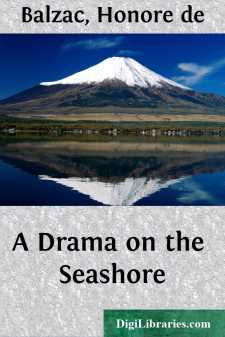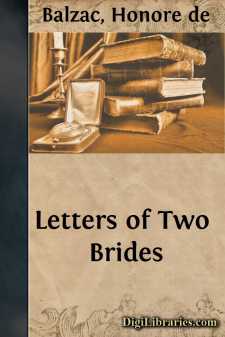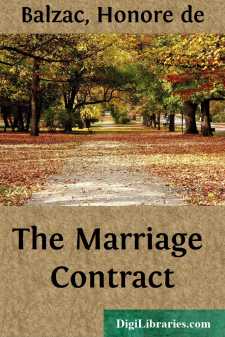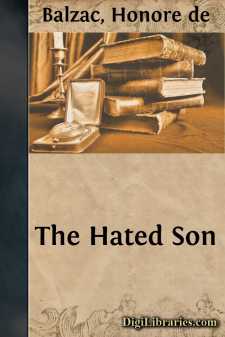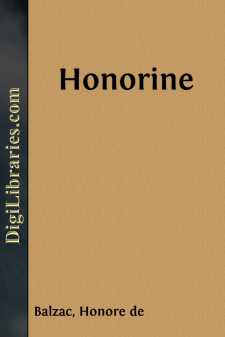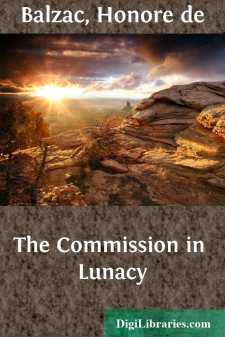Literary Collections
- American 84
- Ancient, Classical & Medieval 14
- Asian 1
- Australian & Oceanian 1
- Canadian 55
- Continental European
- English, Irish, Scottish, Welsh 179
- Essays 160
- General 24
- Letters 46
- Middle Eastern 1
Continental European Books
Sort by:
by:
Honore de Balzac
A DRAMA ON THE SEASHORE Nearly all young men have a compass with which they delight in measuring the future. When their will is equal to the breadth of the angle at which they open it the world is theirs. But this phenomenon of the inner life takes place only at a certain age. That age, which for all men lies between twenty-two and twenty-eight, is the period of great thoughts, of fresh conceptions,...
more...
by:
Honore de Balzac
I. LOUISE DE CHAULIEU TO RENEE DE MAUCOMBE. PARIS, September. Sweetheart, I too am free! And I am the first too, unless you have written to Blois, at our sweet tryst of letter-writing. Raise those great black eyes of yours, fixed on my opening sentence, and keep this excitement for the letter which shall tell you of my first love. By the way, why always "first?" Is there, I wonder, a second...
more...
by:
Honore de Balzac
CHAPTER I. PRO AND CON Monsieur de Manerville, the father, was a worthy Norman gentleman, well known to the Marechael de Richelieu, who married him to one of the richest heiresses of Bordeaux in the days when the old duke reigned in Guienne as governor. The Norman then sold the estate he owned in Bessin, and became a Gascon, allured by the beauty of the chateau de Lanstrac, a delightful residence owned...
more...
by:
Honore de Balzac
EVE AND DAVID Lucien had gone to Paris; and David Sechard, with the courage and intelligence of the ox which painters give the Evangelist for accompanying symbol, set himself to make the large fortune for which he had wished that evening down by the Charente, when he sat with Eve by the weir, and she gave him her hand and her heart. He wanted to make the money quickly, and less for himself than for...
more...
by:
Honore de Balzac
A PASSION IN THE DESERT "The whole show is dreadful," she cried coming out of the menagerie of M. Martin. She had just been looking at that daring speculator "working with his hyena,"—to speak in the style of the programme. "By what means," she continued, "can he have tamed these animals to such a point as to be certain of their affection for——" "What seems to...
more...
by:
Honore de Balzac
CHAPTER I. A BEDROOM OF THE SIXTEENTH CENTURY On a winter's night, about two in the morning, the Comtesse Jeanne d'Herouville felt such violent pains that in spite of her inexperience, she was conscious of an approaching confinement; and the instinct which makes us hope for ease in a change of posture induced her to sit up in her bed, either to study the nature of these new sufferings, or to...
more...
by:
Honore de Balzac
CHAPTER I. THE CHALET At the beginning of October, 1829, Monsieur Simon Babylas Latournelle, notary, was walking up from Havre to Ingouville, arm in arm with his son and accompanied by his wife, at whose side the head clerk of the lawyer's office, a little hunchback named Jean Butscha, trotted along like a page. When these four personages (two of whom came the same way every evening) reached the...
more...
by:
Honore de Balzac
AT THE SIGN OF THE CAT AND RACKET Half-way down the Rue Saint-Denis, almost at the corner of the Rue du Petit-Lion, there stood formerly one of those delightful houses which enable historians to reconstruct old Paris by analogy. The threatening walls of this tumbledown abode seemed to have been decorated with hieroglyphics. For what other name could the passer-by give to the Xs and Vs which the...
more...
by:
Honore de Balzac
HONORINE If the French have as great an aversion for traveling as the English have a propensity for it, both English and French have perhaps sufficient reasons. Something better than England is everywhere to be found; whereas it is excessively difficult to find the charms of France outside France. Other countries can show admirable scenery, and they frequently offer greater comfort than that of France,...
more...
by:
Honore de Balzac
THE COMMISSION IN LUNACY In 1828, at about one o'clock one morning, two persons came out of a large house in the Rue du Faubourg Saint-Honore, near the Elysee-Bourbon. One was the famous doctor, Horace Bianchon; the other was one of the most elegant men in Paris, the Baron de Rastignac; they were friends of long standing. Each had sent away his carriage, and no cab was to be seen in the street;...
more...


